 |
surfresearch.com.au
hill : surfing history, 1921 |
| home | catalogue | history | references | appendix |
|
WITH the advent of surf-bathing, a a new item was added to the long category of sports indulged in by the English-speaking peoples, and like our other outdoor sports, there is none more beneficial unless carried to excess.
Long before anyone
outside certain islanders of the Pacific thought that surf bathing could
become a national sport, as it has done in Australia, swiming baths had
been excavated here and there on the beaches, and the old time bathing
machines with shark-proof en-closures were in evidence on at least one
beach in New South Wales.
The fight by
those who, more broad-minded than local councillors and mid Victorian officials,
realised the health-giving properties of live water was, though brief,
a fairly stubborn one.
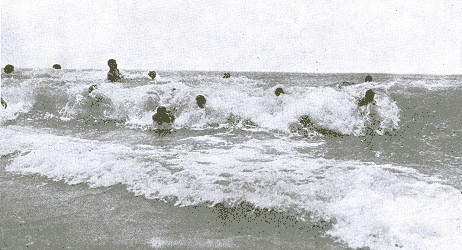 |
"Over the top" on a breaker. |
Page 413
... gentlemen of quality journeyed to sea-side places, as previously they had gone to Bath or Harrogate, or other spas.
But there were
no neck-to-knee costumes in 1770.
There were not
even V's, and, according to the London Bystander, Majesty itself,
Majesty's sons and daughters, the most noble Lords and ladies, the most
respectable of the landed gentry and their beter halves bathed in the sea
even as Aphrodite might have done or Adam and Eve before their adventure
with the apple.
Naturally, too
men bathed in one spot and the women in another, and as remotely as possible-
hence the custom
that obtained before we learnt common sense and started mixed bathing.
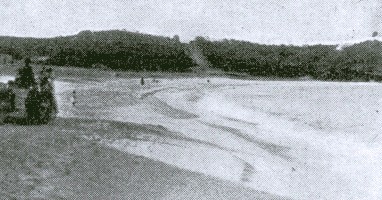 |
showing Beach Street towards the end of the last century. Today the whole of these hills are covered with residences and shops. |
|
pre-surfing days, showing bathing machines with shark proof enclosures. |
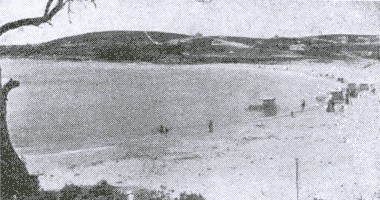 |
Then came what
one might describe as "the costume period," when Beauty arrayed herself
in voluminous and violent eoloured bathing dresses more suitable to a sack
race than natation.
As far as bathing
was concerned she was limited to the length of the rope attached to the
seaward end of the bathing machine, and after bobbing up and down for awhile
retired to the seclusion of that fearsome vehicle to dry hertelf and dress.
Clad as they
then were, it is small wonder that women had no wish to be seen by, or
mix with, their male relatives or friends.
Also, the men
were not yet ready for social intercourse while bathing.
Their costume,
all right amongst themselves, was hardly the thing for calling.
Like the gentleman
in Kipling's verse, "The raiment that he wore was nothing much before and
rather less than 'alf of that be'ind".
Only a few years
ago mixed bathing was absolutely taboo at English watering places.
Trippers who
had visited Osrend and Trouville and other continental bathing resorts
spoke of the scenes there where men and women lolled on the sand (the latter
with considerably more on than they wear in a ballroom to-day), or entered
the water (up to their ankles only, hand in hand, with bated breath.
It was "so foreign,
you know."
With the passing
of Queen Victoria, however, and the ascent to the throne of King Edward
VII., the Englishman and woman began to realise that life need not be all
drab monotony and strict segregation.
Suitable bathing
costumes for both men and women were evolved and beauty, freed from the
tyranny of the bathing rope, and emancipated from the dangerous and clinging
toils of that unspeakable bathing gown, can use to-day, what we always
really knew she possessed, her- legs, and swim in the sea.
To-day Beauty
competes in cross-Channel swims, the ...
Page 414
... Olympic games
and puts up long and short distance records that are a credit to her.
Artistically,
of course, the change is nothing short of miraculous.
Instead of being
a blot upon the seascape, she adorns it, and where else in the world can
one see finer specimens of young womanhood than on the golden sands of
the beaches, fringing Australia's eastern seaboard.
The freedom of
the seas as far as surf bathing in New South Wales is concerned was not
achieved in a moment.
As recently as
1904 local Bumbledom even forbade men the joys of surf bathing between
the hours of 8 a.m. and 6 p.m.
That Beauty would
ever dare to breast the breakers was unthinkable.
But the men who
a few years later scaled Gallipoli's heights were not likely to be beaten
by a few narrow-minded local aldermen, even though these latter were backed
up by the police.
Test cases were
fought in courts from Manly and Coogee, and eventually common sense won
the day and the surf became the sports ground of local residents daily,
and of the tired city toiler of both sexes every week-end.
The surf bath
and the sun bath are to-day a part of our national life, for unlike the
icy waters of the English Channel, the North Sea, or the Irish Channel,
Australian waters are not of too Iow a temperature during the winter months
to debar anyone who cares about it bathing all the year round. There are
many men- curiously enough, mostly well over middle age- and women too,
who never miss their morning dip in the long Pacific swell.
Handsom surf
sheds for both sexes adorn the majority of our beaches, and the profit
from them forms a comfortable addition, in most cases, to the local council's
revenue.
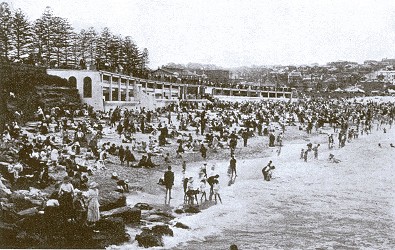 |
showing the great development that has taken place since surf bathing was allowed. |
Page 415
... ward over those in the water, and to also give up many of his evenings to strenuous drill so that when the call comes he may with his fellow life-savers make no mistake with belt, line or wheel.
Only a few months
ago a borough councillor in England made himself notorious by denouncing
mixed bathing, and stated that no man would want to marry a woman once
he had seen her come wet from the water "looking like a skinned rabbit."
We had a similar
parallel in New South Wales a year or two ago, when a local mayor decreed
that no woman should enter the surf on the beach over which his council
held authority unless she wore a skirt.
He based his
decree on much the same line of argument as the councillor in the old country.
Nothing is more
dangerous to a woman in the water than a skirt, and before he passed over
to the Great Majority the mayor was converted to the neck-to- knee habit,
just the same as the borough councillor in England eventually struck his
flag to mixed bathing.
One of the chief
arguments against surf bathing in New South Wales was that it would bring
an undesirable class of people to the beaches and that property would deteriorate.
How wrong that
argument was has since been amply verified.
There are no
more orderly or respectable parts of the Commonwealth than our beaches,
and as to adjacent property deteriorating, it has improved in value beyond
the wildest expectations of those who owned it less than a quarter of a
century ago.
If in wilder
or less civilised parts of the globe trade follows the flag one can certainly
affirm also that trade follows the surfers.
Manly, Coogee,
Bondi and Maroubra and other beaches bear unwavering witness to the fact.
Our fathers won
the freedom of the seas by policing them unceasingly for centuries.
We in Australia
have won the freedom of the surf for the benefit of coming generations,
and having once won this right, are never likely to relinguish it.
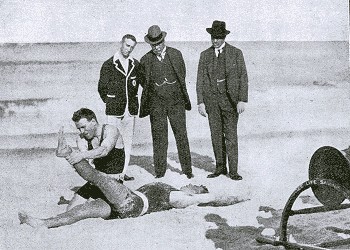 |
Sir Walter Davidson, (centre), inspecting resucitation work by a member of the Coogee Surf Life Saving Club. |
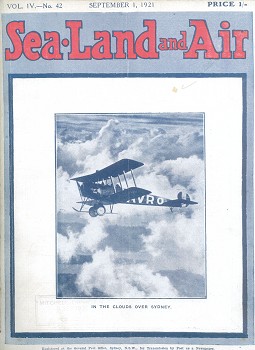 |
The Australian National Monthly of Topical Interest. Official Journal of the Australian Aero Club. The Wireless Institutes of Australia and New Zealand. The Mercantile Marine War Service Association of Australasia. Edited by S. E.Tatham. The Wireless Press, 97 Clarence Street, Sydney, September 1,1921. Hill, E. J.:"Freedom
of the Seas".
|

| home | catalogue | history | references | appendix |